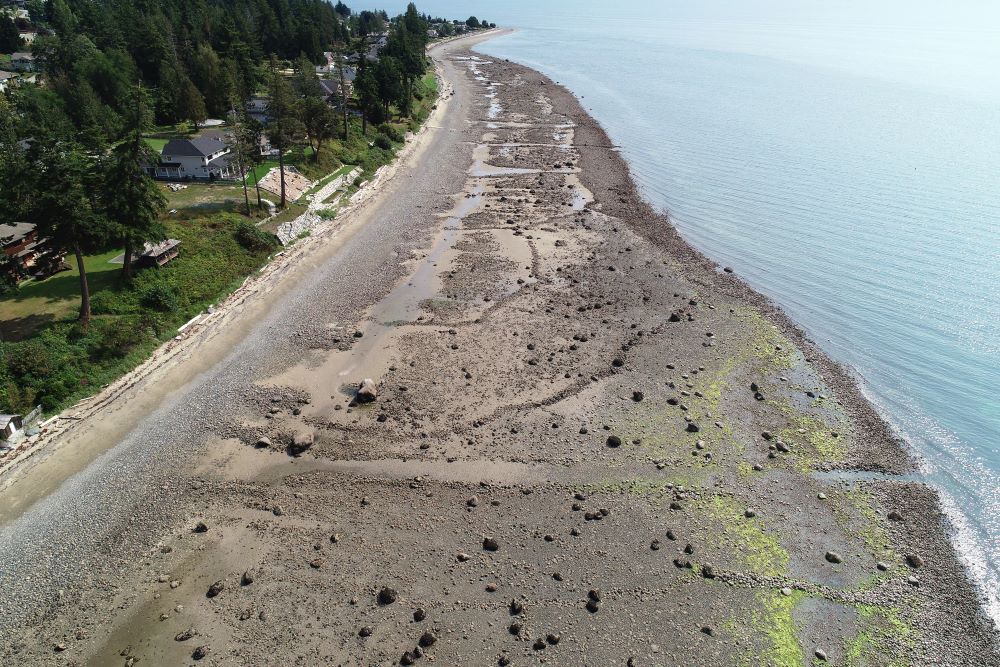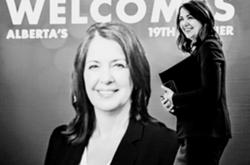Throughout the province — and indeed, the world — there is a growing movement to learn about the names we attribute to places, streets, institutions and organizations, and to change them where appropriate, based on that learning.
One B.C. municipality that has been reckoning with the colonial legacy of its name is the City of Powell River, located on the traditional territory of the Tla’amin people who are a self-governing nation. Israel Wood Powell, after whom the city is named, had no specific connection to this place. However, during his tenure as superintendent of Indian Affairs from 1872 to 1889, he developed and advanced policies that actively harmed and continue to harm people who live here and elsewhere, then and now.
Small town, big effort
As a result of increased awareness, the Powell River Regional District changed its name to qathet Regional District in 2018. qathet means “people working together” and was gifted by Elders from the Tla’amin Nation. Since then, there has been growing interest in and dialogue about place names in our region.
In May 2021, conversations occurred among the three local governments about the possibility of changing the name of the city to one that is more inclusive and respectful. Following that, a joint working group between the city and the Tla’amin Nation was struck, and public education and consultation began in 2022. The process concluded with a report, which put forward 11 recommendations.
While formal discussions have not yet recommenced, a growing number of businesses and organizations have since adopted inclusive and geographically accurate names. In the meantime, polarized debate continues online and in other community spaces.
It is interesting to us that while these conversations are supposedly about the name of a place, the content of them rarely has a great deal to do with either the particular name or this place. Rather, the conversations tend to surface patterns that reflect a common narrative that emerges in many places regarding the issue of eliminating colonial names (or other relics of colonialism).
For this reason we would like to focus on these patterns and how we might better understand and engage with them.
Erasing history
Perhaps the most common rationale presented for not changing the name of the place is that it is erasing history.
Interestingly, it is the conversation about changing the city’s name that has resurfaced Powell’s history. Indeed, at one time even the qathet Museum and Archives (formerly the Powell River Historic Museum and Archives) didn’t include information about the man other than displaying his chair and noting the fact that he was a doctor and the town’s namesake. This has since changed.
Further, there are not many of us who would attend a historic site, gallery or museum and expect to see only items and information that are 150 years old. We all know that history extends beyond our own grandparents. The history of this place is rich and varied, and the historically recent imposition of the name Powell was in fact part of an attempted erasure of Indigenous history and place names here.
Finally, most settlers can extend the notion of our own family histories to before settlement in this place. When we do so, it helps ensure both that we don’t erase the history of the place we live in now, but also that we acknowledge and remember our own ancestors and the places from which they came.
When it comes to both this place and the many communities of people who live here now, what is it about Powell’s story that we wish to hold on to?
Hard to pronounce
There are also those who fear the city may inherit a name that is hard for some people to pronounce. This fear might best be addressed when the city finally proposes a potential new name, so that everyone has a chance to learn how to say it — if necessary.
This does not seem like an insurmountable challenge to us, particularly since most of our ancestors had to learn not only a place name, but an entire language! This includes both settlers, whose ancestors may have spoken Italian, Dutch, or another language in their homelands, and, shamefully, the original inhabitants and stewards of this place as well.
If it comes to it, we all have what it takes to learn a new place name.
Two wrongs
Leading up to a city council delegation on May 4, notices popped up around town urging people to oppose the name change. The last line on the poster read: “two wrongs don’t make a right.” The argument here is that “just” because the place name was forcibly changed once through colonial imposition, changing it again now won’t make it right.
Here, context matters. The violence of stealing land, abducting children, outlawing an entire society’s political and cultural ways, and imposing an apartheid system, which continues in many ways to this day, is not the same as renaming a town. Selecting a name that does not revere an individual who played a significant role in designing and upholding many of these sanctions against First Nations is not a harm at all.
This false equivalency is a continuation of the historical erasure that the name change is in fact attempting to address.
Cancel culture?
Nothing is being cancelled by acknowledging harms, centring Tla’amin’s paramount relationship with this place and committing to learn. Our experience is that there is more room for all of us in a more spacious narrative that takes a more holistic and multi-perspective view on our shared past.
Let’s get back to the names of this place
While these patterns of opposition surface in relation to name changes the world over, it feels appropriate to return the discussion now to this particular place.
Tla’amin people have always had names for the places in their territory. On top of the removal of names that cause harm, there is a growing interest in learning about and using the place names that existed before their colonial replacements became mainstream.
Throughout this territory, specific ʔayʔaǰuθəm (ay-a-joo-thum) place names share vital information about the land, the activities it supports, the natural elements, and more.
Take for example, θaθχaysəm (thath-hay-sum), which is the name for a place many people in the qathet region know as “Southview.” θaθχaysəm means “good gravel beach.” Or take ʔahʔǰumɩχʷ (ah-joo-mieuw), which is the name for a place many people know as “Willingdon Beach.” It means “clear ground.”
By learning and using historically accurate place names we can gain a better understanding of this place we love. We find out more about the many things that occurred here over an extremely long arc of time and continue to this day.
Learning and using ʔayʔaǰuθəm place names can contribute to the development of relationships that are respectful of all that comprise this place: land, water, plants, animals and people who live here. ![]()
Read more: Indigenous, Municipal Politics















Tyee Commenting Guidelines
Comments that violate guidelines risk being deleted, and violations may result in a temporary or permanent user ban. Maintain the spirit of good conversation to stay in the discussion and be patient with moderators. Comments are reviewed regularly but not in real time.
Do:
Do not: